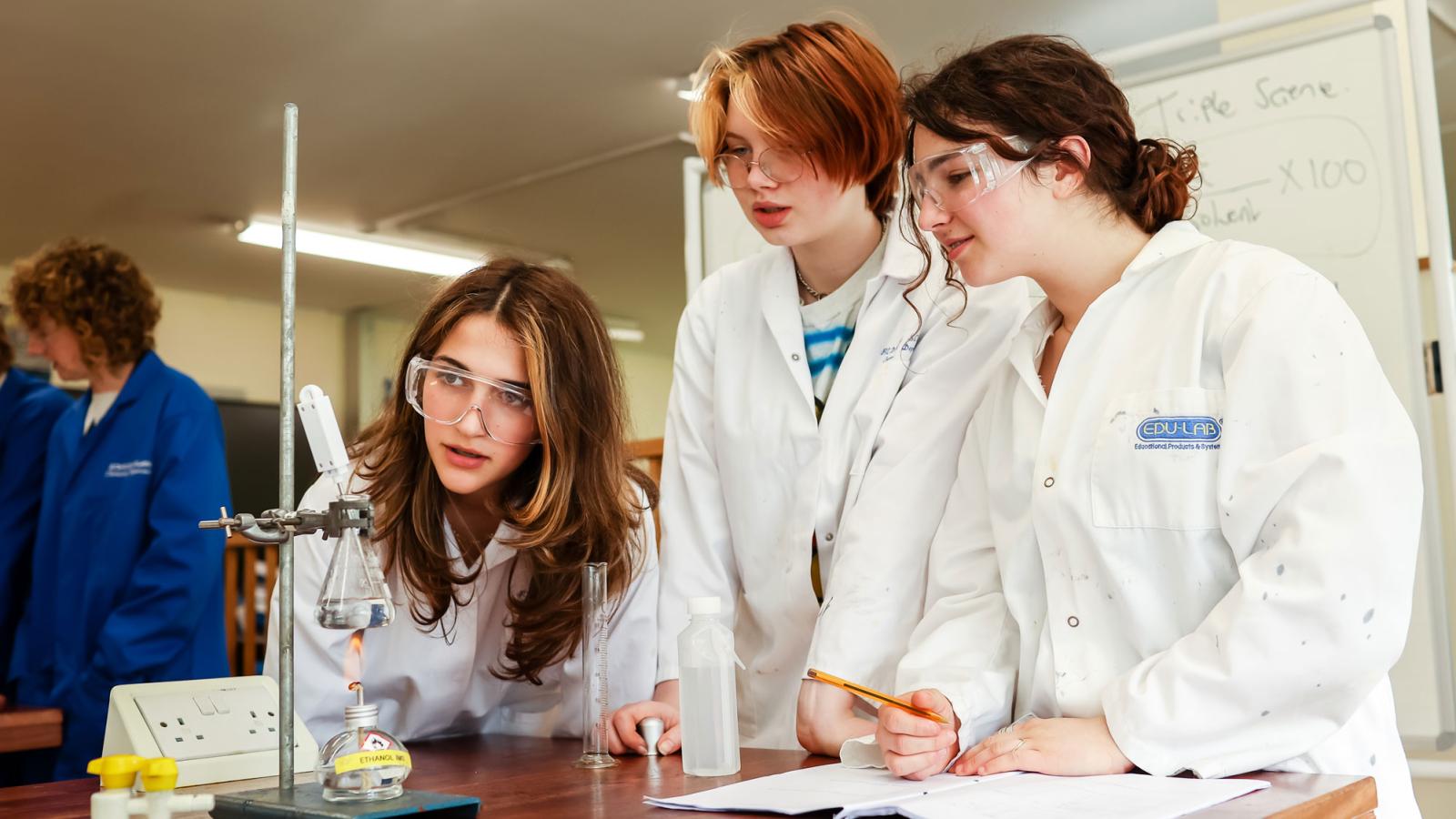- Blocks 3, 4 and 5 (Years 9, 10 and 11)
- Sixth Form
Bedalians' exciting journey into the world of Chemistry begins in Block 3. All Block 3, 4 and 5 students study for IGCSE Double Award qualifications. They have a double and single lesson each week in each of the three separate sciences. The aim of this course is to provide a good grounding in the sciences and to help students develop necessary skills for anyone who is a citizen of the twenty-first century. The course also supports progression for further study of Chemistry at A Level and beyond. Triple Science is an option for all students who wish to spend an extra period per subject in science a week in Blocks 4 and 5.
Practical, hands on laboratory work is at the core of our teaching alongside developing students’ interest in the chemistry of the world around them.
Examining Board: Edexcel IGCSE Science Double or Single Award
Why study Chemistry at A Level?
Chemistry is a fascinating subject with a significant impact on our everyday lives. Studying Chemistry allows you to understand many of the concepts important to modern science. From materials to medicine, biotechnology to biofuels, solar energy to space exploration; Chemistry is shaping our future. Chemistry is a heavily practical subject and there is a strong emphasis on laboratory work, as well as using mathematical skills to solve problems. Chemistry is a fascinating and demanding subject that will enable a deep appreciation of the world around you.
What is studied in Chemistry A Level and how is the course assessed?
| Paper 1: Advanced inorganic and Physical Chemistry | Paper 2: Advanced organic and Physical Chemistry | Paper 3: General and Practical Principles in Chemistry |
| 30% of the total qualification |
30% of the total qualification |
40% of the total qualification |
| Overview of content |
Overview of content |
Overview of content |
|
|
|
| Overview of assessment |
Overview of assessment |
Overview of assessment |
|
|
|
Practical Chemistry at A Level
Students are required to complete 16 core practicals at A Level. The assessment for this is simply pass or fail to ensure that all students can provide evidence of their competency in practical work. Students receive a separate certificate to document that they have met the practical requirements of the course. Furthermore, Paper 3 also tests students’ knowledge and understanding of these practicals. Our teaching is centred on practical laboratory work and we will do far more practical work than the 16 core practicals.
Mathematics in Chemistry A Level
20% of the marks awarded in the assessment of the course are for Level 2 Maths (equivalent to the standard of A*-C in GCSE Maths). This is consistent for all A-level Chemistry examining boards.
Other opportunities for A Level chemists
Every year we aim to organise trips or lectures for 6.1 and 6.2 students to enrich their experience of A Level Chemistry. Examples include a day of lectures in London provided by top academics on a range of exciting and cutting edge issues in Chemistry. Or a trip to the University of Southampton for a twilight session in their undergraduate Chemistry laboratories to carry out practical work which is beyond the scope that is possible in a school laboratory.
Life after Bedales
Some degree courses will expect or strongly prefer candidates to have studied Chemistry. The problem solving skills, ability to deal with abstract concept and the application of mathematical skills are recognised as highly desirable in many areas of study.
|
Medicine Dentistry Veterinary science Chemistry Natural Sciences Biochemistry Chemical engineering Pharmacy Pharmacology Biomedical science Materials chemistry |
Pharmaceutical chemistry Biology Environmental chemistry Forensic chemistry Pathology and microbiology Genetics Molecular and cellular biology Physiological sciences Anatomical science Food science Ecology Zoology |
Geology Marine chemistry Animal science Agriculture Forensic biology Animal biology Marine and freshwater biology Biological sciences Environmental biology Behavioural biology Plant science Sports Science |
Examining Board: Edexcel
Head of Sciences: Liz Stacy
